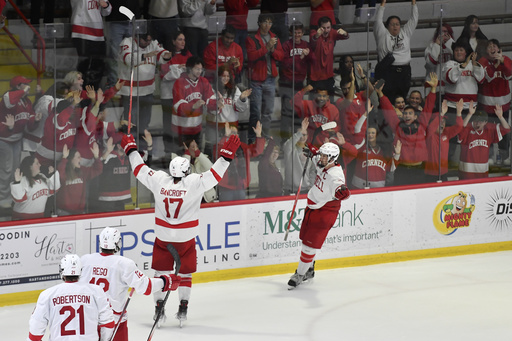The NCAA Division I Council made a significant move on Thursday by approving a rule that will allow players with experience in the Canadian Hockey League (CHL) to compete at U.S. colleges starting next season. This pivotal decision could greatly influence the recruitment landscape for the NHL, particularly concerning its two largest sources of developmental talent.
Effective from August 1, the new ruling rescinds the NCAA’s long-standing prohibition on CHL players, who were previously classified as professionals since they received monthly stipends of up to $600 for living expenses. With this change, athletes participating in major junior hockey or on professional teams may still retain their NCAA eligibility as long as they don’t receive more than the reimbursement of legitimate expenses.
This rule shift not only impacts hockey but also skiing, aligning both with existing NCAA eligibility regulations applied to other sports. The council’s decision marks a significant departure, allowing players nearing their 16th birthday to consider both NCAA and CHL options without being forced into an early commitment exclusively to one or the other.
The revised eligibility criteria could result in a reduction of top talent for the CHL and contribute to an influx of Canadian players onto U.S. college rosters. The ruling also comes on the heels of a class-action lawsuit filed on August 13 in U.S. District Court in Buffalo, New York, targeting the NCAA’s restrictions on players from the CHL’s Western Hockey League, Ontario Hockey League, and Quebec Maritimes Junior Hockey League.
This lawsuit was initiated on behalf of Riley Masterson from Fort Erie, Ontario, who lost his college eligibility two years ago after participating in two exhibition matches for the OHL’s Windsor Spitfires at the age of 16. The suit identifies ten Division I hockey programs to illustrate the adherence to NCAA regulations that barred current and former CHL players.
In an additional development last month, Braxton Whitehead announced his verbal commitment to Arizona State, becoming the first CHL player to pursue hockey at the Division I college level. The 20-year-old plans to compete for the WHL Regina Pats this season before joining the Sun Devils for the 2025-26 season.
For tax considerations, the stipends received by CHL players are not regarded as income. Meanwhile, college athletes are eligible for scholarships and can now earn from endorsements and other uses related to their name, image, or likeness.
This change in eligibility could also affect the USHL, which has traditionally drawn players who opted not to join the CHL to retain their college eligibility. Notably, two recent NHL No. 1 draft picks, Macklin Celebrini of the San Jose Sharks and Owen Power of the Buffalo Sabres, both made their names in the USHL.
In response to the NCAA’s ruling, the USHL stated that its development model is “intentionally aligned with the student-athlete experience.” The league emphasized its commitment to being the leading path for athlete development, focusing on all aspects, including on-ice performance, academic success, and character growth.
